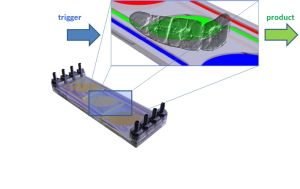Plants produce a number of substances that can be used to treat cancer, Alzheimer’s or Parkinson’s disease. Frequently, however, metabolic pathways to obtain the target substance are so complex that its biotechnological production is hardly effective and very expensive. Scientists of KIT now combine their expertise with the technical know-how of Phyton Biotech GmbH, the biggest producer of pharmaceutical ingredients with plant cells. With the help of a microfluidic bioreactor consisting of coupled modules, the scientists technically reproduce complex plant tissue to produce active substances against cancer or Alzheimer’s disease more effectively and at lower costs.
According to latest estimates, plants form about a million chemical substances, so-called secondary metabolites. Unlike amino acids or sugar, these secondary metabolites are not of vital importance. However, this vast pool of plant products contains a true treasure of pharmaceutically active substances that inhibit the growth of cancer cells or reduce the formation of Alzheimer-typical plaques in the brain.
Many of these valuable ingredients cannot be produced synthetically. Often, they have to be extracted directly from wild plants and processed at high costs. Moreover, many of these plants are rare and endangered: For instance, the discovery of Taxol® inhibiting cancer cells brought the Pacific yew to the brink of extermination. “For this reason, biotechnological approaches to producing the respective active substances are of high interest,” Peter Nick, Professor for Molecular Cell Biology of KIT’s Botanical Institute, says.
Often, underlying metabolic pathways are highly complex. In the natural plant, the substance of interest mostly is the product of a long chain of steps with many converted interim products. The chemical processes required for this purpose do not necessarily take place in a single plant cell, but in several specialized cell types found in the plant tissue from the root to the leaf. Many years ago, Phyton demonstrated that plant-based medical substances, such as Taxol®, can also be produced with minimum resources and sustainably by the cultivation of plant cells in the lab.
“Certain substances, however, can be produced neither in a simple cell culture nor in microorganisms manipulated by genetic engineering, because metabolic pathways are too complex,” Peter Nick says. “Within the framework of a new research project, we now want to technically reproduce plant tissue with various cell types using a so-called microfluidic bioreactor. It consists of several modules, in which one cell type each is cultivated. The modules are connected via channels. Metabolic products of one cell type then enter the next module for further processing without the different cell types being mixed. In the end, the target substance can be extracted from the flow and, hence, “harvested”.
The project is managed by the Jülich Project Management Agency (PtJ) and funded with EUR 750,000 by the Federal Ministry of Education and Research for a period of two years. The project partners are the Botanical Institute and the Institute of Microstructure Technology (both of KIT) and the company Phyton Biotech GmbH. Together, the three partners possess the expertise required for the project. The Botanical Institute contributes its knowledge of molecular cellular biology of plant cell cultures. Professor Andreas Guber and Dr. Ralf Ahrens of the Institute of Microstructure Technology are responsible for the development and fabrication of partial components of microfluidic bioreactors, their microassembly, and interconnection to a functioning system. The industry partner Phyton Biotech GmbH is a worldwide leading company in the area of plant cell fermentation and supplies the expertise and infrastructure needed to analyze potential applications on the industrial scale.
“Cooperation with the experts of KIT will allow us to reach a new level of use of plant cells produced by controlled cultivation,” Dr. Gilbert Gorr, Research and Development Director of Phyton, says. “Our joint objective is to make further natural substances accessible, which so far have been produced with large difficulties and high costs only.”
Phyton Biotech produces high-quality active pharmaceutical ingredients by plant cell fermentation (PCF®) and is worldwide supplier of Paclitaxel and Docetaxel. The company has been inspected successfully by authorities, such as EDQM, EMA, FDA, KFDA, and TGA. Apart from production, Phyton also offers development services for customers. These cover the development of plant cell lines and fermentation processes for plant ingredients as well as the development of synthesis processes of complex substances.
In close partnership with society, KIT develops solutions for urgent challenges – from climate change, energy transition and sustainable use of natural resources to artificial intelligence, sovereignty and an aging population. As The University in the Helmholtz Association, KIT unites scientific excellence from insight to application-driven research under one roof – and is thus in a unique position to drive this transformation. As a University of Excellence, KIT offers its more than 10,000 employees and 22,800 students outstanding opportunities to shape a sustainable and resilient future. KIT – Science for Impact.

